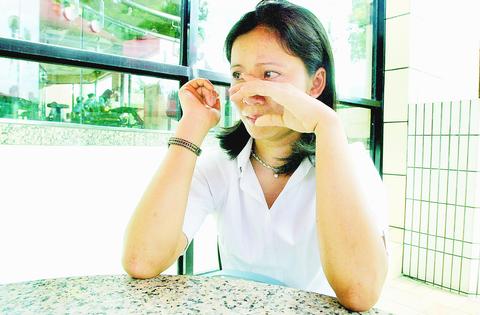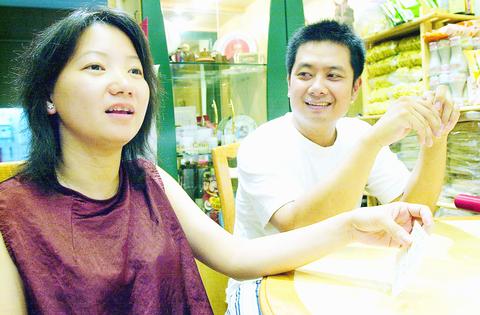Nguyen Thi Leu of Vietnam finally bid farewell to Taiwan on Saturday, which she had called home. During her four-month stay, she said her beautiful dream of a better life in a new country became a nightmare, as her new home turned into hell.
"I'd never want to come back again," she said.
Nguyen, 21, was handpicked by her Taiwanese husband, who is 13 years her senior, at a bride camp in Ho Chi Minh City in May. Three days later, he gave her family NT$5,000 (US$150) as a gift for the wedding.

PHOTO: CHEN CHENG-CHANG, TAIPEI TIMES
While Nguyen thought she was about to embark for a new and better life in a foreign land, she quickly learned that things were not what she had expected.
Just a few days after her wedding, Nguyen found out that her husband was already married with three children, and that his wife was living above their apartment in a building in Wuku, Taipei County. Nguyen said her husband told her that he was divorced from his first wife.
During the four-month marriage, Nguyen said she was physically and verbally abused by her husband, the other wife and the wife's family.

PHOTO: CHEN CHENG-CHANG, TAIPEI TIMES
Although Nguyen personally did not wish to file for a divorce, she said she was tricked into signing divorce papers because she could not read Chinese and spoke little of the language.
"I still love him. He is, after all, my husband," Nguyen said.
Sitting at a McDonald's on Chungshan North Road in Taipei City's Shihlin District, Nguyen said that her four-month marriage has changed her life for good.
"I regret that I married a Taiwanese and I don't think I'll ever get married again," said Nguyen, who was still wearing her gold wedding band.
The second child and the first daughter of a family of six, Nguyen was recruited by the bride camp in Ho Chi Minh City, which promised her family that it would find her a rich husband from either Taiwan or South Korea.
Nguyen's parents, who eke out a meager living by fishing, encouraged her to go to the bride camp because it seemed the only way to get Nguyen -- an elementary school drop-out -- out of poverty.
"I didn't want to go because if I did, I'd have to break up with my boyfriend," she said, wiping her tears.
"I eventually ended up going because I had to help my family pay off its debts."
Nguyen's family had borrowed US$1,000 from loan sharks when she was 15 so that she could have surgery on her intestines. The mounting interest on the loan over the last five years had only exacerbated the family's economic difficulties.
Nguyen said there were about 10 women at the bridal camp while she was there. Food and accommodation were provided free of charge, with the husbands reimbursing the camp for their brides' expenses.
Nguyen's husband paid NT$8,500 to marry Nguyen, including the NT$5,000 that went to her family.
After six months of waiting, Nguyen met her husband. However, the four-month marriage was one nightmare after another.
"His [other] wife did everything to pick fights with me. When she was really upset with me, she would use scissors to cut my clothes," Nguyen said.
In addition to her husband's three children, Nguyen said she also had to take care of her husband's sister-in-law's three children.
Nguyen said she was badly beaten by her husband when she confronted him about tricking her into signing the divorce papers.
"They held me by the hands so he would be easily able to hit me," she said, referring to her husband's wife and his mother-in-law.
After the beating, Nguyen saw a doctor, who gave her a document certifying that she had been injured in a manner which strongly suggested abuse.
Armed with the certificate, Nguyen was ready to file a lawsuit against her husband, but was dissuaded from doing so because he said he would pay her NT$120,000 to settle the matter out of court.
With the money now in her hands, Nguyen said she would use it to help her family pay off its debt.
"One thing I'm reluctant to let go of here is my father-in-law," she said. "A few days ago, he was telling me over the phone how much he missed me. I'd really hate to tell him that our marriage didn't work." (Nguyen's father-in-law did not live in the building with her husband's family.)
Love at first sight
It was love at first sight when Fang Tse (方策) was introduced to Nguyen Thi Diem (no relation to Nguyen Thi Leu), during his vacation in Vietnam in the summer of 1993.
After corresponding for a year, the two finally tied the knot.
Now happily married with a four-year-old boy, Fang, 35, said that he was attracted to Vietnamese women because they are beautiful and share similar culture and customs.
"Although my wife didn't speak Chinese when we met, she took the time to learn and asked her Chinese friends to read my letters to her in Vietnamese and to write me back in Chinese," Fang said at the kitchen table of his Tamsui home on Tuesday evening.
Although his parents at first disapproved of his decision to marry a foreigner, Fang said that they eventually gave in.
When Nguyen first came to Taiwan, the food was one of the many things that she had trouble adjusting to.
"It took her six months to get used to the food and about a year to adapt to the environment," Fang said.
Now looking more Taiwanese than her husband, who is a native of the Paiwan tribe, Yguyen is a volunteer interpreter and counselor at the foreign brides training camps sponsored by Taipei City's civil affairs bureau.
"I know how hard it is to marry a foreign husband and live in a foreign country. My heart sinks when I think of those who are not as lucky as I am to have such a loving husband and such caring in-laws," she said.
Nguyen did not encounter much opposition from her family and friends when she decided to marry Fang.
"My parents adore him because they think he's an honest man although he's not rich," Nguyen said.
"Besides, it doesn't bother me much to live in a foreign country as long as I'm with the one I love."
One piece of advice Nguyen said she would give to foreign brides is to reach out for help.
"Over the past few months as a counselor, I've seen many foreign brides withdraw from society because of their limited communication skills. My advice to them is to speak out because no one will know your problems and come to your rescue if you keep it to yourself," she said.

FREEDOM OF NAVIGATION: The UK would continue to reinforce ties with Taiwan ‘in a wide range of areas’ as a part of a ‘strong unofficial relationship,’ a paper said The UK plans to conduct more freedom of navigation operations in the Taiwan Strait and the South China Sea, British Secretary of State for Foreign, Commonwealth and Development Affairs David Lammy told the British House of Commons on Tuesday. British Member of Parliament Desmond Swayne said that the Royal Navy’s HMS Spey had passed through the Taiwan Strait “in pursuit of vital international freedom of navigation in the South China Sea.” Swayne asked Lammy whether he agreed that it was “proper and lawful” to do so, and if the UK would continue to carry out similar operations. Lammy replied “yes” to both questions. The

‘OF COURSE A COUNTRY’: The president outlined that Taiwan has all the necessary features of a nation, including citizens, land, government and sovereignty President William Lai (賴清德) discussed the meaning of “nation” during a speech in New Taipei City last night, emphasizing that Taiwan is a country as he condemned China’s misinterpretation of UN Resolution 2758. The speech was the first in a series of 10 that Lai is scheduled to give across Taiwan. It is the responsibility of Taiwanese citizens to stand united to defend their national sovereignty, democracy, liberty, way of life and the future of the next generation, Lai said. This is the most important legacy the people of this era could pass on to future generations, he said. Lai went on to discuss

AMENDMENT: Climate change is expected to increase the frequency of high-temperature days, affecting economic productivity and public health, experts said The Central Weather Administration (CWA) is considering amending the Meteorological Act (氣象法) to classify “high temperatures” as “hazardous weather,” providing a legal basis for work or school closures due to extreme heat. CWA Administrator Lu Kuo-chen (呂國臣) yesterday said the agency plans to submit the proposed amendments to the Executive Yuan for review in the fourth quarter this year. The CWA has been monitoring high-temperature trends for an extended period, and the agency contributes scientific data to the recently established High Temperature Response Alliance led by the Ministry of Environment, Lu said. The data include temperature, humidity, radiation intensity and ambient wind,

SECOND SPEECH: All political parties should work together to defend democracy, protect Taiwan and resist the CCP, despite their differences, the president said President William Lai (賴清德) yesterday discussed how pro-Taiwan and pro-Republic of China (ROC) groups can agree to maintain solidarity on the issue of protecting Taiwan and resisting the Chinese Communist Party (CCP). The talk, delivered last night at Taoyuan’s Hakka Youth Association, was the second in a series of 10 that Lai is scheduled to give across Taiwan. Citing Taiwanese democracy pioneer Chiang Wei-shui’s (蔣渭水) slogan that solidarity brings strength, Lai said it was a call for political parties to find consensus amid disagreements on behalf of bettering the nation. All political parties should work together to defend democracy, protect Taiwan and resist